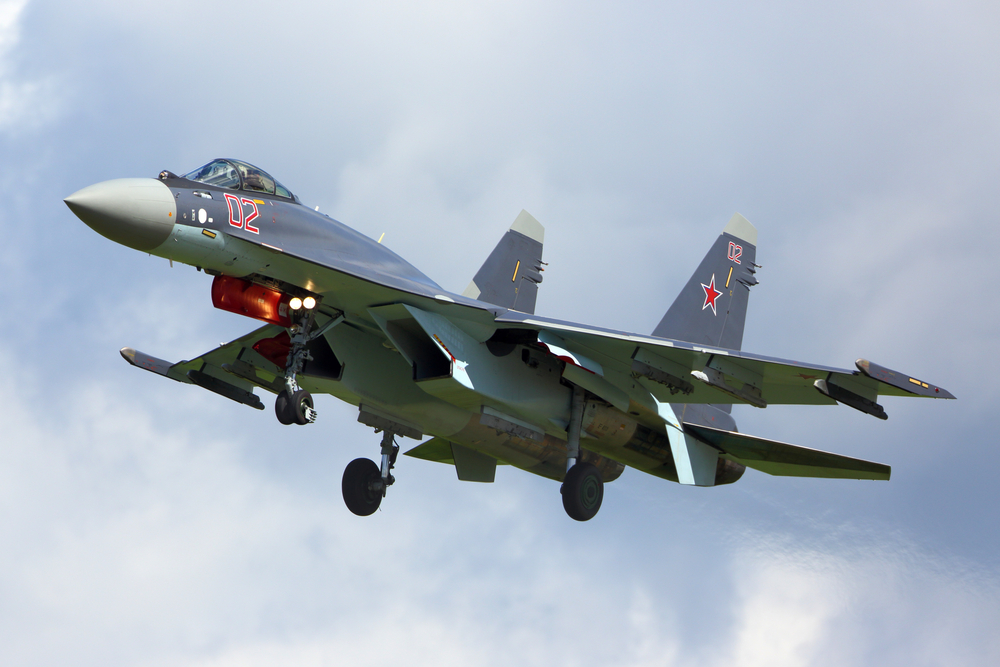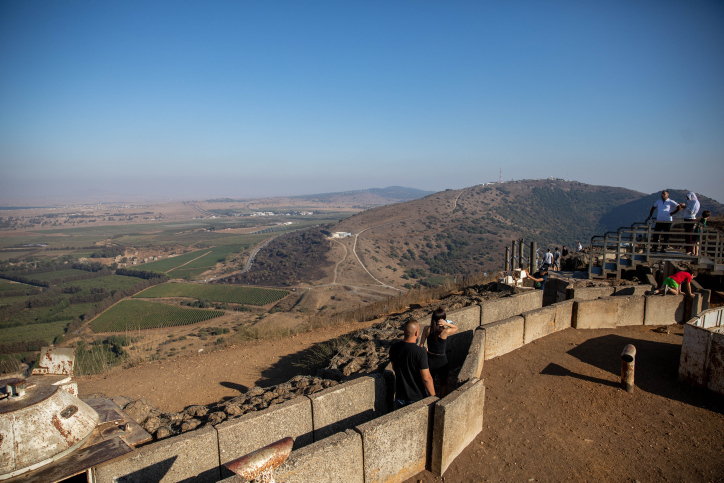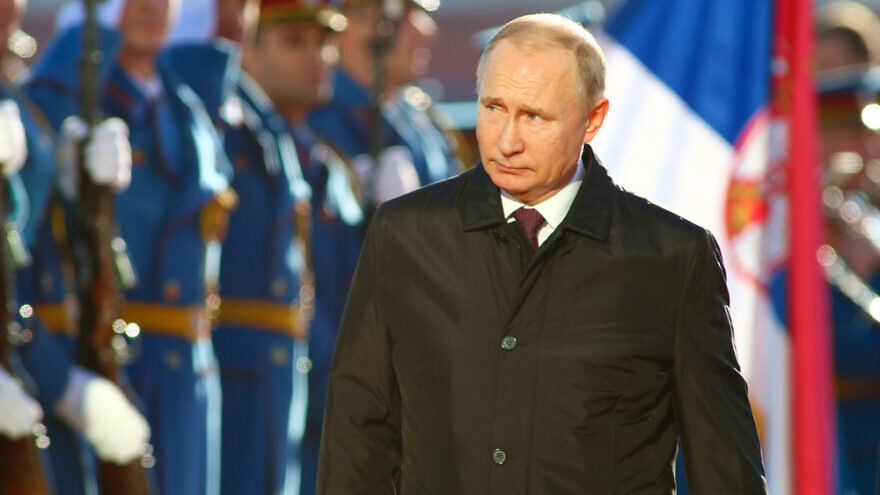Lebanese media outlets as well as Saudi Arabia’s London-based Asharq Al-Awsat have reported that Israel’s freedom of action against Iran in Syria is dwindling as Russia makes changes to its policy vis-à-vis its relationship with Israel. But this so-called reversal of policy by Russia may be manufactured news and does not necessarily reflect reality.
Micky Aharonson, former head of the foreign-relations directorate of the National Security Council in the Prime Minister’s Office and an expert on Russia at the Jerusalem Institute for Strategy and Security, told JNS she does not believe the reports are correct and “doesn’t share the view of the pessimists and their doomsday analyses.”
The unconfirmed July 24 Asharq Al-Awsat report claimed Russian advisers are providing additional support to Syria with improved air-defense systems. In addition, a recent Breaking Defense report claimed this is the first time the Syrians have used the Buk-M2E defense system against Israeli missiles, and that the Israel Defense Forces now plans to rely mostly on long-range standoff weapons, likely from outside Syria’s borders.
Jerusalem and Moscow have in recent years “maintained a hotline that allowed the Israeli military to alert Russian forces of incoming strikes,” the report said, claiming that now, however, “communication through the Israel-Russia deconfliction mechanism has effectively ceased.”
But Aharonson believes that mechanism has not completely ended since theoretically, if Russia sends even more highly developed defense systems to Syria and Israel still maintains a high level of attacks, Russia “would lose face.”

Russia’s defense industry is “super-important for Russia since it is its No. 2 main source of state income after gas and oil, and it is a major source of national pride. Russia wouldn’t risk this,” she said.
The Asharq Al-Awsat report claimed that Moscow has “run out of patience” because Israel “continues to ignore Russian calls to set clear rules.”
Aharonson agreed that Russia is growing impatient with Israel but for other reasons, including because they fear that attacks would unintentionally harm Russian assets or personnel and because in Russia’s view, Israeli attacks send a message of instability in Syria.
She also said Russia “perceives Israel as enjoying a free lunch.”
Russia has allowed Israel relative free reign in preventing an Iranian stronghold in Syria. And in 2019, Russia’s military helped Israel recover from Syria the remains of IDF soldier Zachary Baumel, who was killed during the Battle of Sultan Yacoub in the 1982 Lebanon War.
“Russia could be pressuring Israel for more in return, such as toning down its attacks in Syria,” said Aharonson, adding that it is possible Russia is signaling Israel to do so as a trust-building measure towards Iran.
“This is not happening in a vacuum,” she said. “The world is marching towards signing another [nuclear deal], and Iran will have more leverage, more funds and more influence in the region.”
Russia is simply hedging its bets and demonstrating signs of goodwill towards Tehran in case Iran does eventually become the main player in the Middle East.
Aharonson offered her advice, suggesting Israel’s government “should weigh its operational needs and strategic policy issues.”
“There is no argument in Israel that it must continue to operate against Iranian military entrenchment in Syria,” she said, “but perhaps it needs to be more sensitive in terms of timing and in terms of frequency of its operations.”
“We should first formulate strategy and then focus on operational activities,” she added.
‘Premature to talk about a fundamental change’
Michael Doran, a senior fellow at the Hudson Institute, told JNS he interpreted the “poorly sourced” Asharq Al-Awsat report as “indicative of changes in the Russian-Israeli relationship — of a shift in the regional balance of power in favor of Russia and against Israel.”
He said the report “was not a reliable account of specific events but a sign that the Russians, behaving, one might say, as landlords in Syria, are ‘renegotiating the lease’ with the Israelis to account for changed circumstances.”
Those changes, according to Doran, include a new U.S. administration that is “much less supportive of aggressive and independent Israeli military action against Iran” and “much less hostile to the Russian position in Syria, which has been strengthened significantly as a result.”

The new Israeli government—another major change in the Middle East—“is eager to get along with the Biden team and present its warm relations with the Democrats as an improvement over [former Israeli Prime Minister Benjamin] Netanyahu’s approach,” said Doran.
He said Moscow “understands that these three changes give it a stronger hand in negotiations with the Israelis,” adding that the Alsharq Al-Awsat report “reflects that awareness.”
Doran suggested that if the report comes from “real sources connected to power in Russia, then it is an invitation from [President Vladimir] Putin to the Israelis to renegotiate the terms of their operations in Syria.”
John Hardie, a research manager at Foundation for Defense of Democracies who focuses on Russian foreign and security policy and U.S. policy with Russia, told JNS he believes it would be “premature to talk about a fundamental change in Israeli-Russian relations.”
In his view, the recent Russian statements and media reports concerning Israeli operations in Syria indicate Russia “is seeking to regulate the rules of the road for those operations.”
Similar to Aharonson, Hardie noted that Moscow “may also want to counteract recent negative publicity regarding its air-defense systems … and assuage likely Syrian frustration about Israel’s success in thwarting Russian-made air-defense systems.”
Hardie agreed with Aharonson, saying he would interpret the recent events “more as tactical signaling than evidence of a strategic change.”
‘Mostly bluster and signaling’
So is Russia moving to limit Israeli action against Iran in Syria?
It’s possible that Moscow is stepping up support for Damascus defense, but according to Hardie, Russia’s recent statements are “mostly bluster and signaling.”
“Israel has proven itself capable of operating where and when it needs to,” he said.
He added that Russia “likely does want to impose stricter rules of the road for Israel’s operations in Syria, but I doubt the Russians would take drastic measures that would cause a serious rift in Russian-Israeli relations, such as downing an Israeli warplane.”
While the Asharq Al-Awsat report also said Russia changed its policy following understandings with the United States, Aharonson said this is “unlikely” and that she “does not believe it was discussed that way at all.”
Hardie said he “can’t speak to the claims about alleged Biden administration understandings with the Kremlin or disapproval of Israel’s operations,” though Moscow has likely noticed U.S. President Joe Biden’s “appeasement of Iran, desire to avoid U.S. military involvement in the Middle East and signals that his administration will be less enthusiastic in supporting Israel than the Trump administration was.”
“It’s possible Moscow is testing the Biden administration to see whether and how hard it will push back,” said Hardie. “The Biden administration should take this opportunity to offer full support, both publicly and privately, for Israeli security and Israel’s operations in Syria, including by providing intelligence support where possible.”


























